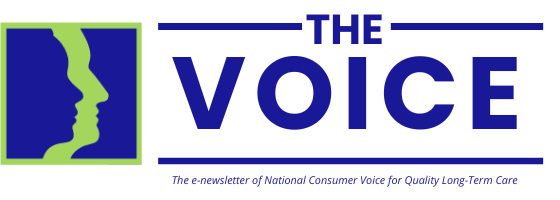|
February 21, 2023
In this Issue:
- LTC Consumers and Their Family Members Invited to Participate in Listening Sessions on Diversity, Equity and Inclusion in LTC
- Nursing Home Staffing Standards Benefits Residents and Workers; Webinar this Thursday
- Guide from PHI on Direct Care Workforce State Advocacy
- Exploratory Study Looks at Theft of Opioids in Long-Term Care Settings
|
|
LTC Consumers and Family Members Invited to Participate in Listening Sessions on Diversity, Equity and Inclusion in LTC
Consumer Voice and the National Long-Term Care Ombudsman Resource Center (NORC) are inviting long-term care consumers and their family members to listening sessions to share experiences, views, and recommendations on how long-term care can be more inclusive and equitable for all the diverse populations in your community. Consumer Voice and NORC are supporting a Washington state Long Term Care Commission that aims to transform long-term care to make it a more attractive career opportunity for caregivers as well as one that is more responsive and inclusive of all diverse cultures and marginalized or minority groups. We hope to be able to use the work done in this Commission to develop trainings and best practices that could be applied nationwide.
During each hour-long listening session, the University of Washington’s School of Nursing and the Cross Cultural Health Care Program (CCHCP) facilitators will guide the group through a discussion to elicit your opinions and recommendations on topics related to diversity, equity and inclusion in long-term care, including your views about areas to improve as well as what is already working well to make long-term care more inclusive.
Long-Term Care Consumer Listening Session
Wednesday, March 8th at 2:00pm ET
Register Now
Family Member Listening Session
Wednesday, March 22nd at 2:00pm ET
Register Now
IMPORTANT: The listening session will be limited. We will admit the first 30 participants from the waiting room. If you cannot join the discussion, you will be able to respond to a questionnaire with the same discussion questions.
|
|
Nursing Home Staffing Standards Benefit Residents and Workers; Webinar This Thursday
This month marks the one-year anniversary of President Biden's announcement of historic nursing home reforms. A minimum staffing standard in nursing homes was central to his plan. Since his announcement, the Centers for Medicare & Medicaid Services (CMS) has embarked on a study to determine the minimum level of direct nursing care all residents need and has promised to propose a standard this spring.
Implementing a minimum staffing standard would be the most significant increase in protections for nursing home residents in decades. Evidence shows the impact that staffing has on residents and workers:
The nursing home industry's opposition to a minimum staffing standard has been fierce. The voices of residents and workers have been lost in the discussion. Over the next several months, Consumer Voice and resident advocates will center the discussion of minimum staffing standards on residents and workers by holding a series of events to uplift their voices.
Tune into a webinar kicking off our campaign "Dignity for All: Staffing Standards Now!" this Thursday, February 23rd at 2:00pm ET.
Register Now
|
|
Guide from PHI on Direct Care Workforce State Advocacy
Over the last two decades, state leaders have advanced a broad range of policies to strengthen the direct care workforce. However, many states still have a long way to go. PHI has created a new digital state advocacy guide on the direct care workforce that offers advice across 20 strategic areas, with 60 clear action steps to help state advocates move forward policies that enable direct care workers to thrive in their jobs and everyone to access the quality services and supports they need.
Get the Guide
|
|
Exploratory Study Looks at Thefts of Opioids in Long-Term Care Settings
A new exploratory study from the University of Connecticut looks at thefts of controlled substances, like opioid pain medications, in long-term care settings. The study, led by gerontologist and researcher at UConn’s Institute for Collaboration on Health, Intervention, and Policy Eilon Caspi, evaluated 107 Minnesota Department of Health investigation reports of "drug diversion" in nursing homes and assisted living facilities from 2013 to 2021. The study found that a total of 11,328.5 tablets were stolen from 368 residents, although the actual number of stolen tablets is likely higher because 12% of the investigation reports the study examined did not include the number of medications stolen. About 94% of stolen medications were opioid pain medications.
“My hope is that this exploratory study will raise public awareness of this form of elder mistreatment and encourage education in these settings and encourage other researchers to study it more rigorously. Older adults living in long-term care settings have a right to be free from this largely invisible form of mistreatment. This is their home," Mr. Caspi said.
Read the Full Study
|

|
